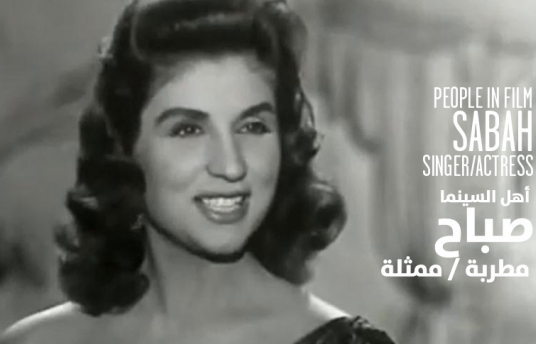People in Film: Sabah
Mar 05, 2012

Written by Reem Saleh, New Media, DFI
She had trademark blonde hair and a contagious smile. She swayed from side to side when she sang. That’s how I grew up remembering the glamorous Lebanese singer and actor Sabah. A few years ago, I had the chance to be part of a TV crew who interviewed the legendary actor for three consecutive hours. She was 82 years old then. I was excited but at the same time, I was critical about her never ending media appearances. I felt she was living in the shadows of the past. I thought she should quit show business, leaving us with memories of her eternal youth. Her contemporaries, Shadia, Faten Hamama and Hind Rostom had all quit before the final curtain fell.
We arrived at one of the less glamorous hotels of Beirut where she was living at the time. She was accompanied by her hairdresser and manager, Jospeh Gharib. She was broke and lonely. I thought she might be living in a castle, but that’s another story. But there she was: all dressed up and seated for the interview. She was nothing if not punctual.
The camera rolled and her eyes sparkled immediately. She asked politely we show her the monitor. We asked about the past, about her beginnings in Egypt back in the 1940s. She found fame when producer Assia Dagher sent her a ticket to come and audition in Cairo after hearing about her talent from her brother-in-law. Dagher gathered experts to assess this Sabah’s voice. They thought she needed some training, but Egyptian filmmaker Henry Barakat thought she could act immediately. She signed contracts for three films, and in 1943 marked her debut in the film “El Kalb lo Wahed” (The Heart Has Only One Love). A star was born. In her career, she featured in more than 86 films and 3,000 songs in her repertoire.
During our interview, Sabah went on talking about the giants of cinema she worked with, her historical singing film duos with Syrian actor Farid Al Atrache and Abdel Halim Hafiz, the most popular Egyptian singer of the time. Her nostalgic tone of voice immediately carried me back to an era of black and white movies, reviving the golden era of Arab cinema in my mind. Sabah always had a side story to the people she worked with. She regaled me with tales of how singer Abdel Halim used to jump from the window to see her to avoid her conservative family. She’d smile occasionally, absent in her own memories. The woman in front of me was no longer an old lady in her eighties, but an ageless precious diamond.
Throughout our interview, Sabah spoke in the present tense with passion, considerably when asked about the love of her life, Roshdy Abaza. He was the Egyptian acting legend she married for only three days in 1967. She left him because he was still married to Samia Jamal, a famous Egyptian belly dancer. He remains the love of her life. “When I see him in a film, he’s so real and I feel that he’ll come out of the screen any second to be with me,” she said.
In the 1950s and 1960s, Sabah’s personal life and multiple marriages (eight or nine at the last count) made many headlines in gossip columns. She was rich and generous to a fault. Several ex-husbands called her “The Bank”. Throughout it all, Sabah refused to mention anything negative about any of her enemies. Later, people forgot her natural talent. Her voice, grace and beauty were victims of the gossip industry. Yet in her heyday, Sabah challenged society with her independence, her voice, and her lavish lifestyle. She was a free spirited woman who preferred her freedom to anything else.
At the end of our meeting, I understood that just as Arabic cinema could not exist without Sabah, she could not exist away from the camera. If the spotlight was to turn away, she would wither and die. As she once told a writer, “Even if there’s just a little light, it’s enough for me to survive”.